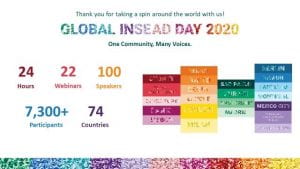Business as a Force for Good
Bart Hartman
Founder & CEO at NOTS Solar Lamps
My speech to the brightest 2% of international young business leaders.
In 1987 I did an MBA at Insead in Fontainebleau. Last Monday I went back to give the keynote speech at the opening ceremony for the new MBA class. I built my speech on Insead’s mission ‘Business as a Force for Good’ and tried to inspire the 240 students to become a force for good.
Here’s what I told them:
Why is ‘becoming a force for good’ a good idea?
“I really enjoyed my life as a profit seeking entrepreneur. And prior to that, working as a consultant with McKinsey was great and I learned a lot.
But contributing something to a better world, in my case providing electricity to low-income African households, gives a unique kind of satisfaction. Working with people from a completely different culture can be extremely frustrating. But when you accomplish something together, it feels so good. And the beauty of it is that this type of satisfaction comes on top of the ‘normal’ buzz you get from things like solving a problem, closing a deal and socializing with your colleagues.
Becoming a force for good is good for you personally because you get to a level of fulfilment you can’t achieve when you remain a profit-seeking entrepreneur or a ‘normal’ employee in a company
A second reason to become a force for good is that it is very much needed. We are facing huge problems in the world: climate change, poverty, inequality, racism, COVID-19, the list goes on.
For a long time, we thought – hoped – that organizations like the UN, World Bank, governments and NGOs would solve these problems. Unfortunately, this isn’t happening. So, we need other actors – and that means you.
If you look at the size of start-ups compared to the size of the problem they are addressing, it becomes clear that relying on start-ups alone will just take too long
There are many promising start-ups that aim to solve one or other of these problems. NOTS Solar Lamps, the social enterprise I founded, is one of them. However, if you look at the size of these start-ups compared to the size of the problem they are addressing, it becomes clear that relying on start-ups will just take too long.
Since 2010 about 500 companies worked towards providing African households with solar home systems. The largest sold about 200,000 systems last year. Compare this with the 125 million African households that still don’t have electricity, and it is clear that if we rely only on start-ups, we won’t solve the electricity problem in Africa.
Unfortunately, the same is true for the other, defining problems of our times.
So, we can’t get there with start-ups alone. We need the big corporates too. First of all, because they played – and still play – an important role in causing the problems. They use scarce natural resources (minerals, water, etc.) for manufacturing their products. They emit CO2. They pay wages in developing countries that are so low, people can’t have a decent living. Secondly, only big corporates have the capabilities, capital, brands and client base needed to solve the big problems at scale.
The big corporates won’t devote themselves to solving the big problems without some push, from inside or outside the company.
The CEOs of Blackrock and former CEOs of Unilever and DSM are still the exceptions. For instance, last year the CEOs of 180 large companies that form the US Business Council announced that they would move their focus from shareholders-only, to all stakeholders including employees and clients. And just last week an interesting analysis of the 2019 annual reports of these 180 companies was published. Over 95% of the CEOs in their ‘letter from the CEO’ addressed only the shareholders. No other stakeholders were mentioned. So, these companies, and most others, still have a long way to go to become that force for good.
Here is where you – profit seeking entrepreneurs and ‘normal’ company employees – come in. If you want a prosperous, healthy, happy future for yourself and for your children, you have to become a force for good.
In business there are two main routes to that goal. You can become a social entrepreneur. Or as an employee and senior manager, you can convince your CEO to replace profit maximization as goal #1 with an impact goal, which makes profit a means to a better end.
It would be irresponsible for you to leave these challenges to others
Plus, don’t forget, becoming a force for good brings you to a higher level of satisfaction and happiness. Way more than you’ll find as a profit-maximizing entrepreneur or manager.
Most of you came to Fontainebleau because you want to change something drastically in your professional life.You can’t address your desire for change in a better way than by becoming a force for good.
I want to challenge you as individuals but also as a class. You, Class July 2021, use your time together here at Insead to develop a force for good project that has such a big positive impact that you are proud of it. Do something so good that papers like the Economist and Financial Times write about it.
I am sure that with your combined brainpower, you will come up with an excellent Class July 2021 Force for Good project.
Good luck.”

